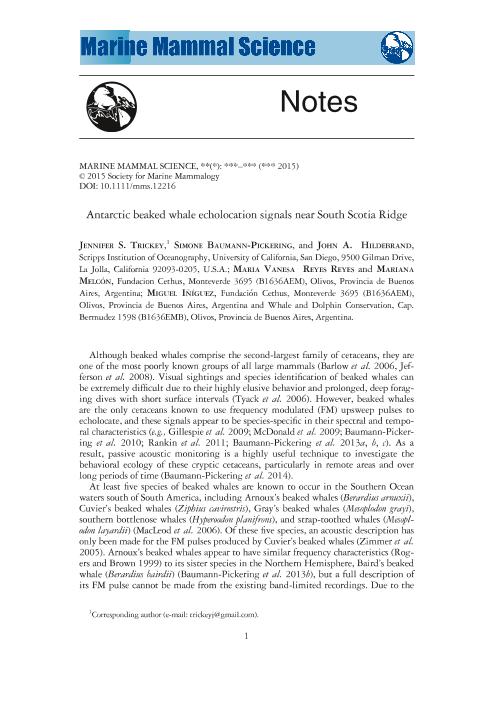Mostrar el registro sencillo del ítem
dc.contributor.author
Trickey, Jennifer S.
dc.contributor.author
Baumann-Pickering, Simone
dc.contributor.author
Hildebrand, John

dc.contributor.author
Reyes Reyes, María Vanesa

dc.contributor.author
Melcón, Mariana
dc.contributor.author
Iñíguez, Miguel
dc.date.available
2019-05-27T16:49:31Z
dc.date.issued
2015-07
dc.identifier.citation
Trickey, Jennifer S.; Baumann-Pickering, Simone; Hildebrand, John; Reyes Reyes, María Vanesa; Melcón, Mariana; et al.; Antarctic beaked whale echolocation signals near South Scotia Ridge; Wiley Blackwell Publishing, Inc; Marine Mammal Science; 31; 3; 7-2015; 1265-1274
dc.identifier.issn
0824-0469
dc.identifier.uri
http://hdl.handle.net/11336/77203
dc.description.abstract
Several species of beaked whales inhabit the Southern Ocean, but information on their abundance, distribution, and seasonality is scarce. However, beaked whales are the only cetaceans known to use frequency modulated (FM) upsweep pulses to echolocate, and these signals appear to be species-specific in their spectral and temporal properties. Accordingly, passive acoustic monitoring has proven useful to investigate the behavioral ecology of these elusive species. Acoustic recordings were collected in Antarctic waters with both a towed hydrophone array as well as a bottom-moored High-frequency Acoustic Recording Package (HARP) deployed near Elephant Island that recorded between March and July 2014. The acoustic data revealed several beaked whale signal types of unknown origin. Of the five species of beaked whales known to occur in the survey area, an acoustic description has only been made for the FM pulses produced by Cuvier?s beaked whales (Ziphius cavirostris). Signal characterization using custom MATLAB-based routines determined that three unidentified FM pulse types are distinctly different from the signal of Cuvier?s beaked whales, and are also unlikely to belong to Arnoux?s beaked whales (Berardius arnuxii). Southern bottlenose whales (Hyperoodon planifrons) likely produce the most dominant beaked whale signal type (BW29) in the towed array and HARP data. The sources of the two less commonly detected echolocation signals, BW37 and BW55, are possibly Gray?s beaked whales (Mesoplodon grayi) and strap-toothed whales (M. layardii). Acoustic encounters over several months indicated differences among the various species in diel and seasonal use of the area near the recorder. Ongoing passive acoustic monitoring in the Southern Ocean will allow us to explore long-term relative abundance and distribution, as well as consistent seasonal and diel patterns, and will provide insight into the ecological role of beaked whales in an ecosystem that is undergoing rapid environmental transitions as a result of climate change.
dc.format
application/pdf
dc.language.iso
eng
dc.publisher
Wiley Blackwell Publishing, Inc

dc.rights
info:eu-repo/semantics/openAccess
dc.rights.uri
https://creativecommons.org/licenses/by-nc-sa/2.5/ar/
dc.subject
Beaked Whale
dc.subject
Echolocation
dc.subject
Upsweep
dc.subject
Scotia Ridge
dc.subject.classification
Otras Ciencias Biológicas

dc.subject.classification
Ciencias Biológicas

dc.subject.classification
CIENCIAS NATURALES Y EXACTAS

dc.title
Antarctic beaked whale echolocation signals near South Scotia Ridge
dc.type
info:eu-repo/semantics/article
dc.type
info:ar-repo/semantics/artículo
dc.type
info:eu-repo/semantics/publishedVersion
dc.date.updated
2019-05-23T20:33:23Z
dc.journal.volume
31
dc.journal.number
3
dc.journal.pagination
1265-1274
dc.journal.pais
Reino Unido

dc.journal.ciudad
Londres
dc.description.fil
Fil: Trickey, Jennifer S.. University of California at San Diego. Scripps Institution of Oceanography; Estados Unidos
dc.description.fil
Fil: Baumann-Pickering, Simone. University of California at San Diego. Scripps Institution of Oceanography; Estados Unidos
dc.description.fil
Fil: Hildebrand, John. University of California at San Diego. Scripps Institution of Oceanography; Estados Unidos
dc.description.fil
Fil: Reyes Reyes, María Vanesa. Fundación Cethus; Argentina. Consejo Nacional de Investigaciones Científicas y Técnicas. Oficina de Coordinación Administrativa Ciudad Universitaria. Instituto de Física de Buenos Aires. Universidad de Buenos Aires. Facultad de Ciencias Exactas y Naturales. Instituto de Física de Buenos Aires; Argentina
dc.description.fil
Fil: Melcón, Mariana. Fundación Cethus; Argentina
dc.description.fil
Fil: Iñíguez, Miguel. Whale And Dolphin Conservation; Estados Unidos. Fundación Cethus; Argentina
dc.journal.title
Marine Mammal Science

dc.relation.alternativeid
info:eu-repo/semantics/altIdentifier/doi/http://dx.doi.org/10.1111/mms.12216
Archivos asociados
